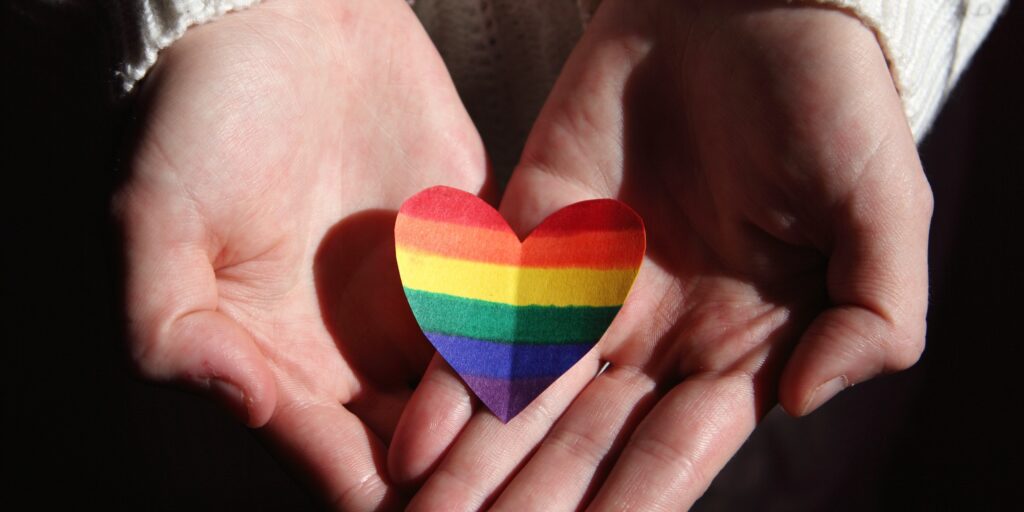An essay on what Canada’s ban on conversion therapy means to me as an advocate for inclusion and safety for 2SLGBTQ+ people in faith communities.

OPINION | The views expressed in this article are those of the author.
My name is Pam Rocker. I am the Director of Affirming Connections, an organization based in Southern Alberta. We support the voices of people of faith, faith communities, and organizations that work to eliminate religious discrimination and to provide affirming and brave spaces for people to explore their spirituality, without any barriers to inclusion or fear of exclusion.
I founded Affirming Connections in 2018 because I know that religious-based discrimination against queer folks is still rampant, and that religious attacks require religious responses. There are so many people and communities who support 2SLGBTQ+ people being their full selves and who want their places of worship to be true sanctuaries. I wanted to be a part of giving that good news a platform.
I became involved with professionals, activists, and community leaders who were lobbying for the conversion therapy ban in 2019 when I first heard that Alberta’s incoming UCP government had disbanded the Conversion Therapy Ban Working Group. I knew that provincial government support would not be possible under that leadership, and that it was going to take hard work from our communities to enact sustainable and legal change.
In 2020, I helped organize petitions, letter writing, and a rally in Calgary in support of a proposed local bylaw. The bylaw included banning conversion therapy practices and making sure that those who continued to perpetuate this “therapy” would face meaningful consequences. In February, over 100 of us gathered at Calgary’s City Hall. Wearing rainbow scarves, we showed our overwhelming support for the bylaw and made a public statement that 2SLGBTQ+ people should never be forced to change who they are, how they identify, how they express their gender, or who they love. And no one should be made to choose between their faith and their sexual orientation or gender identity.
The City of Edmonton banned conversion therapy on December 10, 2019, and Calgary followed on May 25, 2020. After several grueling days of hearing painful true stories from conversion therapy survivors, and harmful rhetoric from those who supported conversion therapy, we were exhausted and overwhelmed with how much trauma queer folks have to share for even the chance to be taken seriously. However, we still rejoiced. The strength of survivors and our allies moved City Council to vote in favour of the strongest bylaw against conversion therapy approved anywhere in Canada up to that time. A letter signed by 44 Clergy Members in Calgary – who publicly stated that conversion therapy and all its practices have no place in our faith communities or in society – supported our efforts.
I grew up thinking God would only love me if I was a “good” Christian, married to a man. So that’s what I did. My faith was meaningful for me in many ways, but the concept of hell terrified me. And it kept me in the closet for far too long. I performed different forms of conversion therapy on myself, hoping that I would be cured, praying I would change. I finally realized there was nothing unnatural or sinful about who I was. I did not want to leave my faith behind, but I would no longer hide or believe the lie that others could control my access to the divine. I was finally free. Everyone deserves the same freedom to explore their spirituality without any barriers to inclusion, and without having to fracture themselves in order to belong.
While it is amazing that we now have a clear nationwide ban of this harmful practice, the fight to truly end conversion therapy is far from over. Unfortunately, there is evidence to suggest there are still people experiencing conversion therapy since the nation-wide ban came into effect. We need diverse strategies to truly eradicate not only conversion therapy, but the erroneous, unscientific, and unbiblical beliefs that are the foundation of these practices.
If you are a survivor of conversion therapy, or if you are at risk of being subjected to it right now, please know you are not alone. There are people in your corner who want to help you. There are many resources available, including on the Community-Based Research Centre’s website. There is also lots of information on inclusive theology and understanding how faith and 2SLGBTQ+ identities can go together on the Affirming Connections website.
For those of us who are lucky enough to be seen by our friends, family, and faith communities as worthy of love and respect just the way we are, it’s our collective responsibility to use that privilege to uplift and protect those who are at risk of this practice. Be public in your support and let folks around you know what you stand for and that you are a safe person and advocate.
To get connected with our organization, Affirming Connections, please check out our events, social media channels, videos, resources, and list of Affirming Ministries across Canada. You are not alone!
Looking for more information?
Disclaimer
The information in this article was correct at time of publishing. The law may have changed since then. The views expressed in this article are those of the author and do not necessarily reflect the views of LawNow or the Centre for Public Legal Education Alberta.
Looking for articles like this one to be delivered right to your inbox?

